- Home
- Patrick O'Brian
The Mauritius Command Page 16
The Mauritius Command Read online
Page 16
Chapter Five
The Admiral was pleased with the Commodore, as well he might be, for not only had Jack captured one of the four powerful French frigates that so disturbed Mr Bertie's peace of mind, and retaken two Indiamen together with a useful eighteen-gun sloop, not only had he destroyed one of the strongest French bases in the Indian Ocean, doing so with such briskness that the Admiral's dispositions would be admired even in Whitehall, which always called for quick results, but he had also enriched Mr Bertie to the extent of several thousand pounds. Just how many thousand it was impossible to say until a tribe of officials six thousand miles away should have set a value on a prodigious number of objects such as the three hundred and twenty pikes, forty rammers and forty sponges taken at St Paul's; but in any case Admiral Bertie would eventually receive one twelfth of the total sum that they arrived at: without having stirred hand or foot, without having given any advice more valuable than a general exhortation to 'go in and win', he had acquired a considerable addition to his fortune; and ever since his first charming conference with Captain Corbett, the forerunner of the squadron, he had spent the chief of his time in drawing up detailed plans for new stabling and a pine-house at Langton Castle, where he lived, while in default of the coronet for which she longed, Mrs Bertie should have a suit of lace.
Yet although the Admiral was perhaps a little devious beneath his bonhomie he had a grateful heart—a fairly grateful heart; at least he was no gripe farthing; and the moment the Raisonable was signalled he began to lay on a feast, sending two boats away to the westward for lobsters, his favourite dish.
As he led the Commodore towards this glowing spread, which was attended by almost all the eminent men and all the beautiful women of Cape Town, so long as they were white, he said, 'How happy I am to see you back so soon, Aubrey, and how very well things have turned out! I sent Corbett straight home with your splendid news, as soon as I had dashed off my covering letter: you will have a Gazette to yourself, I am sure. What a pretty ship she is, too, your Bourbonnaise—fine narrow entry, and as stiff as a steeple. I wish our yards could turn 'em out like that: yet after all, if you young fellows take 'em ready made, it saves our shipwrights' time, eh? Ha, ha. I confirmed her new name, by the by, and shall confirm all your appointments: I am glad Clonfert is made post, though that was a sad unlucky stroke with the Company's silk: I dare say you keel-hauled him for it at the time. Still, 'tis of no use crying over spilt milk, as I always tell Mrs Bertie; and all's well that ends well. Clonfert is made post, and you have taken four thumping prizes and half a dozen little ones. You did not see anything else on your way down, I suppose, Just for the bonne bouche, as they say, ha, ha?'
'Well, sir, we sighted that Russian sloop Diana beating about off Rodriguez; but I thought I should best fall in with your views by disregarding her.'
The Admiral did not seem to hear. After a momentary absence he went on, 'Well, and so you knocked their batteries about their ears. I am glad of it, and Farquhar is cock-a-hoop, as far as a dry stick of a man like that can be cock-a-hoop—drinks no wine, and the water has rotted all the joy out of him—I did not ask him to this dinner: in any case, he declines all invitations. He is longing to see you, however, and your Dr Maturin; for the next bite, once Rodriguez is reinforced, is Bourbon for good and all. Or La Réunion, or Ile Buonaparte, as they call it. Damned fools: this chopping and changing is typical of your foreigner, don't you find, Aubrey? That should be with the next monsoon, as long as transports can be provided for three or four thousand men. What kind of man is this Dr Maturin, may I ask? Is he to be trusted? He looks something of the foreigner to me.'
'Oh, I believe he is quite trustworthy, sir,' said Jack, with an inward grin. 'Lord Keith has a great opinion of him: offered him to be physician of the fleet. And the Duke of Clarence called him in, when the whole faculty was at a stand. He thinks the world of Dr Maturin.'
'Oh, indeed?' cried the Admiral, deeply impressed. 'I shall have to take care of him, I find. Not that these clever politicoes can really be trusted, you know. You must take a long spoon to sup with the Devil, I always say. However, let us get to our lobsters. You can trust my lobsters, Aubrey, ha, ha. I sent a couple of boats to the westward for 'em, the moment you made your number.'
The lobsters were trustworthy, so were the oysters, so was the rest of the enormous meal, which carried on, remove after remove, until the cloth was drawn at last and the port appeared, when Admiral Bertle called out, 'Fill up, gentlemen. Bumpers all round. Here's to Lucky Jack Aubrey with three times three; and may he thump 'em again and again.'
A week later the Governor of the Cape also honoured the Commodore with a feast. It consisted of game—blauwbok, springbok, steinbok, klipspringer, hartebeest, wildebeest, the black and the blue—no lobster at all, and it took even longer to eat; but this was as far as the Governor's originality could take him; once more the meal ended with cabinet pudding, and once more the guests drank their port wishing that Jack might thump them again and again.
At the time of this second toast Stephen was eating bread and cold meat with Mr Farquhar and Mr Prote, his secretary, in an upper room of the government printinghouse, a secluded place from which the workmen had withdrawn. They were all of them more or less black, for in the light of Stephen's most recent intelligence they had been recasting a proclamation to the people of La Réunion, as well as a number of handbills and broadsheets that painted, in glowing colours and fluent French, the advantages of British rule, promising respect for religion, laws, customs and property, pointing out the inevitably disastrous consequences of resistance, and the rewards (perhaps a little imprecise and rhetorical) of cooperation. There were similar documents, though in a less forward state of preparation, addressed to the inhabitants of Mauritius; and all these were to be printed as secretly as possible, with the help of two confidential journeymen. Yet since neither of these knew a word in French, Farquhar and Prote had been perpetually in and out of the house, and both had grown fascinated by the technical processes of printing. In their eagerness to show Stephen their proficiency they corrected three long texts in the galley, reading by means of a little looking-glass that they tended to snatch from one another, plucking out letters, inserting others, prating about upper case, lower case, formes, coigns and composing-sticks, setting-rules and justification, and gradually smearing themselves, and him, with an unreasonable quantity of printer's ink.
They were no longer talking about the act of printing, however, not even about their insidious printed warfare: that, together with Stephen's detailed report of the promising state of public feeling on La Réunion and his account of the agents he had acquired, was far behind them; and now, as they ate their blotted meat, they discussed the poetry of the law, or rather poetry in the law, a subject to which they had been led by considerations on the inheritance of landed property in Mr Farquhar's future kingdom.
'The French system, their new French code, is very well on paper,' observed Farquhar, 'very well for a parcel of logical automata; but it quite overlooks the illogical, I might say almost supra-logical and poetic side of human nature. Our law, in its wisdom, has preserved much of this, and it is particularly remarkable in the customary tenure of land, and in petty serjeanty. Allow me to give you an example: in the manors of East and West Enbourne, in Berkshire, a widow shall have her free-bench—her sedes libera, or in barbarous law Latin her francus bancus—in all her late husband's copyhold lands dum sola et casta fuerit; but if she be detected in amorous conversation with a person of the opposite sex—if she grant the last favours—she loses all, unless she appears in the next manor-court, riding backwards on a black ram, and reciting the following words:
'Here I am
Riding on a black ram
Like a whore as I am;
And for my crinkum-crankum
Have lost my binkum-bankum;
And for my tail's game
Am brought to this worldly shame.
Therefore good Mr Steward let me have my land
s again.
'My uncle owns one of these manors, and I have attended the court. I cannot adequately describe the merriment, the amiable confusion of the personable young widow, the flood of rustic wit, and—which is my real point—the universal, contented acceptance of her reinstatement, which I attribute largely to the power of poetry.'
'There may be a significant statistical relationship between the number of black ram-lambs suffered to reach maturity,' said Prote, 'and that of personable young widows.'
'And 'tis no isolated case,' continued Farquhar. 'For in the manor of Kilmersdon in Somerset, for example, we find what is essentially the same purgation, though in an abbreviated form, since no more than this distich is required:
'For mine arse's fault I take this pain.
Therefore, my lord, give me my land again.
'Now is it not gratifying, gentlemen, to find our black rams—unprofitable creatures but for this interesting ceremony—so far apart as Berkshire and Somerset, with no record of a white ram's ever having been admitted? For your black ram, gentlemen, is, I am persuaded, intimately connected with the worship of the Druids . . .'
Mr Farquhar was a man with a good understanding and a great deal of information, but at the first mention of Druids, oak-groves or mistletoe a wild gleam came into his eye, a gleam so wild on this occasion that Stephen looked at his watch, rose to his feet, said that he must regretfully leave them, and gathered up his book.
'Should you not like to wash before you go?' asked Farquhar. 'You are somewhat mottled.'
'Thank you,' said Stephen. 'But the being upon whom I am about to wait, though eminent for precedence, does not stand on ceremony.'
'What can he have meant by eminent for precedence?' asked Mr Prote. 'Anyone who is anyone, apart from us, is at the Governor's.'
'He may well mean a black magus, or a potentate among the Hottentots. Now the Druids, I say . . . '
In fact the being's precedence was merely alphabetical: for in the gaiety of his heart Dr Maturin had referred to the aardvark. It stood before him now, a pale creature with a bulky hog-backed body close on five feet long, a broad tall, an immense elongated head ending in a disk-like snout, short stout legs and disproportionately. long translucent ass's ears; it was partially covered with sparse yellowish hair that showed the unwholesome nightwalker's skin below; it blinked repeatedly. The aardvark was acutely conscious of its position and from time to time it licked its small tubular lips, for not only had it been measured and weighed, while a tuft of bristles that could ill be spared had been clipped from its flank, but now it was being looked at through a diminishing-glass and drawn. It was a meek, apologetic animal, incapable of biting and too shy to scratch; and it grew lower and lower in its spirits: its ears drooped until they obscured its weak, melancholy, long lashed eyes.
'There, honey, it is done,' said Stephen, showing the aardvark its likeness: and calling upwards through the ceiling he said, 'Mr van der Poel, I am infinitely obliged to you, sir. Do not stir, I beg. I shall lock the door and leave the key under the mat: I am going back to the ship, and tomorrow you shall see the egg.'
Some hours later he beheld Simon's Town again, its inner anchorage scattered with Jack's prizes: It reminded him of Port Mahon long ago, when the Sophie's captured feluccas, trabacaloes and xebecs lined the quay. 'That was very well,' he said, 'and Minorca a delightful island; but even Minorca could never boast the aardvark.' The street was filled with liberty-men, a cheerful crew, for not only had Jack ordered a modest advance of prize money—two dollars a nob paid down on the capstan-head—but Dr Maturin's words on loot had not been obeyed quite as strictly as he could have wished, and pieces of the finest Oriental silk, slightly charred, covered the lithe forms, the infinitely seductive bosoms of the sailors' companions. He was hailed on all sides; kind hands led his hired nag away; and a Boadicean midshipman, smelling strongly of patchouli, rowed him out to the Raisonable. At ease in his spacious cabin he opened his book and looked at the picture again. 'It is perhaps the most gratifying beast I have ever figured,' he said, 'and it displays a touching affection for the good Mr van der Poel; I believe I shall attempt to colour it.' He turned back through the pages. Most were covered with the small close-written text of his diary, but there were several drawings—the Rodriguez tortoise, the seals of False Bay—some washed with water-colour. 'Perhaps not,' he said, considering them. 'My talents scarcely seem to lie that way.' He converted the Dutch weight of the aardvark into avoirdupois, sharpened his pen to a finer point, reflected for a while, gazing out of the scuttle, and began to write in his personal cipher.
'I cannot trace the chain of thought or rather of associations that leads me to reflect upon Clonfert and Jack Aubrey. Conceivably the aardvark plays a part, so ill at ease: but the links are obscure. Clonfert's tormina exercise my mind; for by whatever private scale of pain one may measure them, they must come tolerably high. It seems ludicrously facile to regard them as the direct transposition of his state of mind; yet McAdam is no fool except to himself; and in some not dissimilar cases that Dupuytren and I dissected we were able to eliminate any direct physical cause. The vermiform appendix, so often the villain in these apparent strangulations, as pink as a healthy worm, the whole tract from the oesophagus downwards, devoid of lesion. Clonfert is more of an Irishman, with the exacerbated susceptibilities of a subject race, than I had supposed; more indeed than I gave Jack to understand. I find that as a boy he did not attend a great English public school, as did most of his kind I have known; nor did he go early to sea and thereby wash away the barrier: the first years of his nominal service were book-time, as they call the amiable cheat by which a complaisant captain places an absent child upon his muster-roll. Far from it: he was brought up almost entirely by the servants at Jenkinsville (a desolate region). Squireen foster-parents too for a while, his own being so mad or so disreputable: and he seems to have sucked in the worst of both sides. On the one hand he derived his notion of himself as a lord from people who have had to cringe these many generations to hold on to the odd patch of land that is their only living; and on the other, though half belonging to them, he has been bred up to despise their religion, their language, their poverty, their manners and traditions. A conquering race, in the place of that conquest, is rarely amiable; the conquerors pay less obviously than the conquered, but perhaps in time they pay even more heavily, in the loss of the humane qualities. Hard, arrogant, profit-seeking adventurers flock to the spoil, and the natives, though outwardly civil, contemplate them with a resentment mingled with contempt, while at the same time respecting the face of conquest—acknowledging their greater strength. And to be divided between the two must-lead to a strange confusion of sentiment. In Clonfert's case the result of this and of other factors seems to me an uneasy awareness of his own distinction (he often mentions it), a profound uncertainty of its real value, and a conviction that to validate its claims he should be twice as tall as other men. In spite of his high heels, both literal and figurative, he is not twice as tall as other men: Jack, in particular, tops him by a head and more. He has surrounded himself with a strikingly inferior set of officers, which I do not remember to have seen done in the Navy, where the aristocratic captains are almost always accompanied by aristocratic officers and midshipmen, just as a Scotch commander will gather Scotchmen around him: no doubt they provide him with the approval he longs for; but how much can a man of his understanding value their approval? And if Lady Clonfert and Mrs Jennings are a fair example of his women, to what degree can their favours really gratify him?
'Upon this foundation, and upon what McAdam tells me, I could build up a moderately convincing Clonfert whose entire life is an unsatisfactory pretence: a puppet vainly striving to be another puppet, equally unreal—the antithesis of Jack, who has never played a part in his life', who has no need for any role. It would not satisfy me, however, for although it may have some truth in it and although it may go far towards pointing at the origin of the tormina and some other symptons I hav
e noted (McAdam did not appreciate the significance of the asymmetric sudor insignis), it does not take into account the fact that he is not a puppet. Nor, which is far more important, does it take into account the affection of his men: Jack asserts that sailors love a lord and no doubt that is profoundly true (apart from anything else, the fancied difference diminishes the servitude); but they do not go on loving a lord if he is worthless. They did not go on loving Prince William. No: a continued affection over a long period must be based upon the recognition of real qualities in the man, for a ship at sea, particularly a small ship on a foreign station, is an enclosed village; and whoever heard of the long-matured judgment of a village being wrong? The communal mind, even where the community is largely made up of unthinking and illiterate men, is very nearly as infallible as a Council. And the qualities valued by a community of men are commonly good nature, generosity and courage. Courage: here I am on the most shifting ground in the world. For what is it? Men put different values on their lives at different times: different men value approval at different rates—for some it is the prime mover. Two men go through the same motions for widely different reasons; their conduct bears the same name. Yet if Clonfert has not performed these actions I am very sure that his men would not esteem him as they do. Farquhar's illogicality may well render their affection for Lord Clonfert greater than it would be for Mr Scroggs, but that is merely an addition; the esteem is already there, and so are the actions upon which it is founded. I saw him storm a battery at St Paul's; and in the result his outward gestures, his elan, and indeed his success were indistinguishable from Jack Aubrey's.

 The Final Unfinished Voyage of Jack Aubrey
The Final Unfinished Voyage of Jack Aubrey The Rendezvous and Other Stories
The Rendezvous and Other Stories Caesar: The Life Story of a Panda-Leopard
Caesar: The Life Story of a Panda-Leopard The Hundred Days
The Hundred Days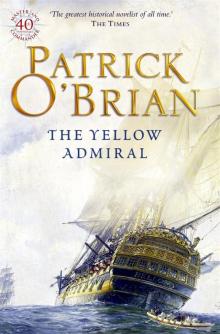 The Yellow Admiral
The Yellow Admiral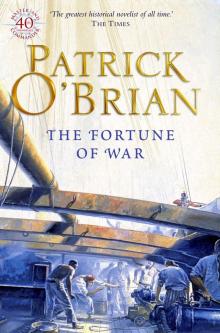 The Fortune of War
The Fortune of War The Mauritius Command
The Mauritius Command Beasts Royal: Twelve Tales of Adventure
Beasts Royal: Twelve Tales of Adventure A Book of Voyages
A Book of Voyages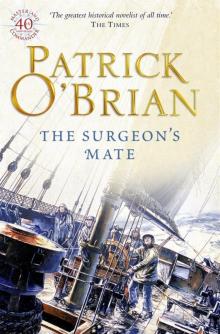 The Surgeon's Mate
The Surgeon's Mate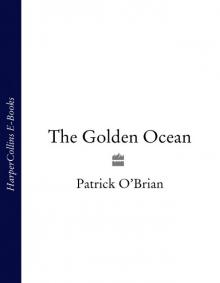 The Golden Ocean
The Golden Ocean Hussein: An Entertainment
Hussein: An Entertainment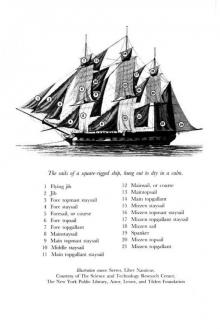 H.M.S. Surprise
H.M.S. Surprise The Far Side of the World
The Far Side of the World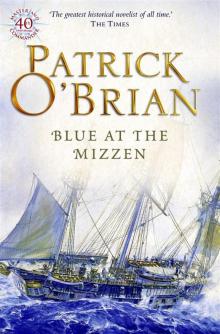 Blue at the Mizzen
Blue at the Mizzen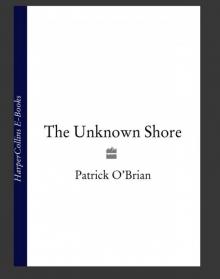 The Unknown Shore
The Unknown Shore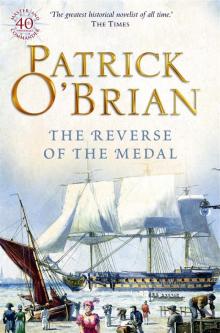 The Reverse of the Medal
The Reverse of the Medal Testimonies
Testimonies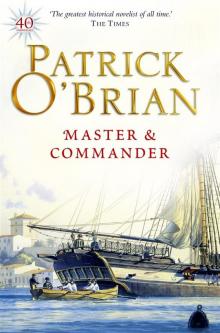 Master and Commander
Master and Commander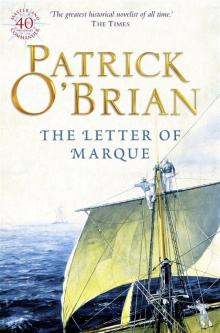 The Letter of Marque
The Letter of Marque Treason's Harbour
Treason's Harbour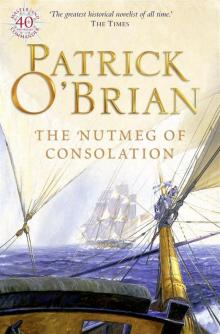 The Nutmeg of Consolation
The Nutmeg of Consolation 21: The Final Unfinished Voyage of Jack Aubrey
21: The Final Unfinished Voyage of Jack Aubrey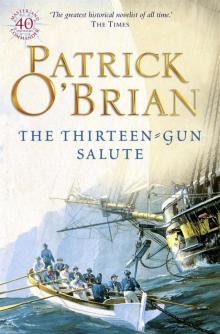 The Thirteen-Gun Salute
The Thirteen-Gun Salute The Ionian Mission
The Ionian Mission Men-of-War
Men-of-War The Commodore
The Commodore The Catalans
The Catalans Aub-Mat 08 - The Ionian Mission
Aub-Mat 08 - The Ionian Mission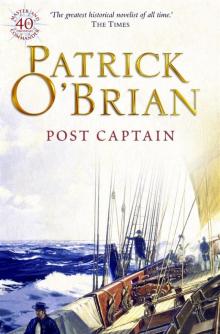 Post Captain
Post Captain The Road to Samarcand
The Road to Samarcand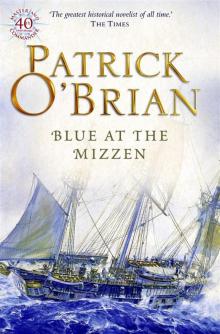 Book 20 - Blue At The Mizzen
Book 20 - Blue At The Mizzen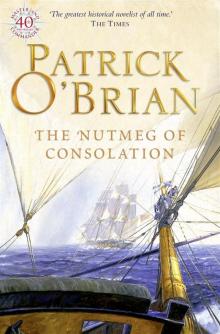 Book 14 - The Nutmeg Of Consolation
Book 14 - The Nutmeg Of Consolation Caesar
Caesar The Wine-Dark Sea
The Wine-Dark Sea Book 8 - The Ionian Mission
Book 8 - The Ionian Mission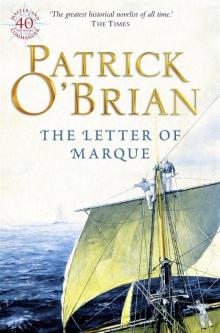 Book 12 - The Letter of Marque
Book 12 - The Letter of Marque Hussein
Hussein Book 9 - Treason's Harbour
Book 9 - Treason's Harbour Book 19 - The Hundred Days
Book 19 - The Hundred Days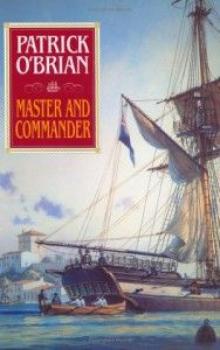 Master & Commander a-1
Master & Commander a-1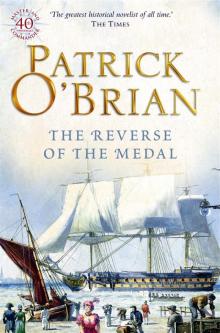 Book 11 - The Reverse Of The Medal
Book 11 - The Reverse Of The Medal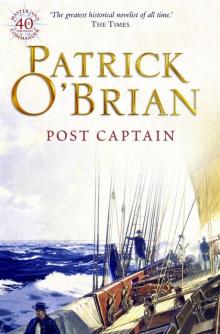 Book 2 - Post Captain
Book 2 - Post Captain The Truelove
The Truelove The Thirteen Gun Salute
The Thirteen Gun Salute Book 17 - The Commodore
Book 17 - The Commodore The Final, Unfinished Voyage of Jack Aubrey
The Final, Unfinished Voyage of Jack Aubrey Book 10 - The Far Side Of The World
Book 10 - The Far Side Of The World Book 5 - Desolation Island
Book 5 - Desolation Island Beasts Royal
Beasts Royal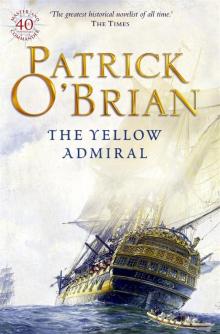 Book 18 - The Yellow Admiral
Book 18 - The Yellow Admiral Book 15 - Clarissa Oakes
Book 15 - Clarissa Oakes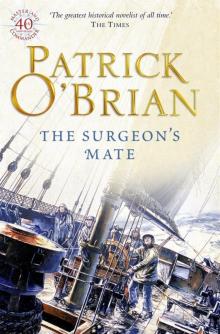 Book 7 - The Surgeon's Mate
Book 7 - The Surgeon's Mate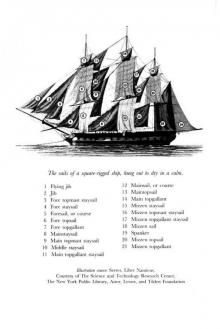 Book 3 - H.M.S. Surprise
Book 3 - H.M.S. Surprise Desolation island
Desolation island Picasso: A Biography
Picasso: A Biography Book 4 - The Mauritius Command
Book 4 - The Mauritius Command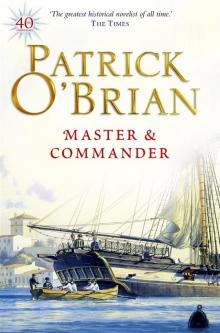 Book 1 - Master & Commander
Book 1 - Master & Commander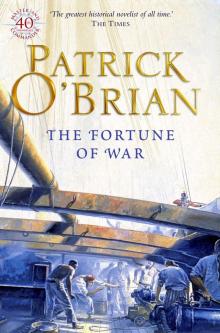 Book 6 - The Fortune Of War
Book 6 - The Fortune Of War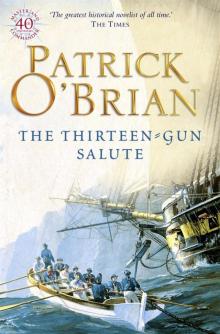 Book 13 - The Thirteen-Gun Salute
Book 13 - The Thirteen-Gun Salute Book 16 - The Wine-Dark Sea
Book 16 - The Wine-Dark Sea